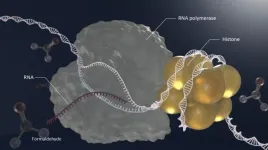(Press-News.org) Research Highlights:
Treating gum disease within three months after a heart procedure to correct an irregular heart rhythm, known as atrial fibrillation (AFib), may lower the chances of it reoccurring.
Inflamed gums may predict AFib recurrence after heart ablation, a procedure to fix the irregular heartbeat.
AFib patients should be examined for gum disease and encouraged to seek dental treatment, researchers said.
Embargoed until 4 a.m. CT/5 a.m. ET Wednesday, April 10, 2024
DALLAS, April 10, 2024 — Treating gum disease in the 3-months after a procedure to correct an irregular heartbeat known as atrial fibrillation (AFib) may lower oral inflammation and may reduce AFib recurrence, according to new research published today in the Journal of the American Heart Association, an open access, peer-reviewed journal of the American Heart Association.
According to the U.S. Centers for Disease Control and Prevention (CDC), about half of American adults ages 30 or older have some form of periodontal or gum disease, with the incidence increasing with age.
This study is among the first to investigate the potential impact of gum disease treatment on AFib. AFib is a condition in which the heart beats irregularly, increasing the risk of stroke by five-fold. More than 12 million people in the U.S. are expected to have AFib by 2030, according to the American Heart Association’s 2024 Heart Disease and Stroke Statistics.
“Gum disease can be modified by dental intervention. Proper management of gum disease appears to improve the prognosis of AFib, and many people around the world could benefit from it,” said lead study author Shunsuke Miyauchi, M.D., Ph.D., an assistant professor at the Health Service Center at Hiroshima University in Japan who engages in general cardiology, arrhythmia practice and research.
Researchers followed 97 patients who had undergone the non-surgical procedure to correct AFib (radiofrequency catheter ablation) and received treatment for gum inflammation along with 191 ablation patients who did not receive treatment for gum disease. Catheter ablation is a procedure that uses radiofrequency energy to destroy a small area of heart tissue causing rapid and irregular heartbeats. This study found that an index measuring the severity of gum inflammation was associated with the return of AFib.
After the ablation procedure, during the average follow-up period of between 8.5 months to 2 years, researchers found:
AFib recurred among 24% of all participants throughout the follow-up period.
Patients with severe gum inflammation who had it treated after heart catheter ablation were 61% less likely to have a recurrence of AFib, compared to ablation patients who did not have treatment for severe gum inflammation.
Patients who had recurrences of AFib had more severe gum disease than those who did not have recurrences.
Having gum disease, being female, experiencing irregular heartbeat for more than two years and left atrial volume were predictors for AFib recurrences. Left atrial volume often leads to AFib recurrence as it includes thickening and scarring of connective tissues, Miyauchi explained.
Miyauchi noted that, “While the main findings were consistent with their expectations, we were surprised how useful a quantitative index of gum disease, known as periodontal inflamed surface area or PISA, could be in cardiovascular clinical practice.”
While the American Heart Association does not recognize oral health as a risk factor for heart disease, it recognizes that oral health can be an indicator of overall health and well-being. Bacteria from inflamed teeth and gums may travel through the bloodstream to the rest of the body, including the heart and brain. Chronic gum inflammation may be associated with other systemic health conditions, including coronary artery disease, stroke and Type 2 diabetes.
Study details and background:
A total of 288 adults (66% men; 34% women) being treated for AFib were enrolled in this study.
The single center study was conducted from April 1, 2020 to July 31, 2022, at Hiroshima University Hospital in Hiroshima, Japan, and all participants were Asian.
Enrollees were examined by a dentist before undergoing catheter ablation for AFib.
“We are now working on further research to reveal the mechanism underlying the relationship between gum disease and AFib,” Miyauchi said.
The study’s limitations include: a small number of patients enrolled from a single center; patients were not randomized to receive dental treatment; periodontal status was not followed up after the initial examination among the participants who did not receive gum disease treatment; and inflammatory markers were not reassessed after the ablation procedure.
Co-authors, disclosures and funding sources are listed in the manuscript.
Studies published in the American Heart Association’s scientific journals are peer-reviewed. The statements and conclusions in each manuscript are solely those of the study authors and do not necessarily reflect the Association’s policy or position. The Association makes no representation or guarantee as to their accuracy or reliability. The Association receives funding primarily from individuals; foundations and corporations (including pharmaceutical, device manufacturers and other companies) also make donations and fund specific Association programs and events. The Association has strict policies to prevent these relationships from influencing the science content. Revenues from pharmaceutical and biotech companies, device manufacturers and health insurance providers and the Association’s overall financial information are available here.
Additional Resources:
Multimedia is available on the right column of release link https://newsroom.heart.org/news/treating-gum-disease-after-heart-rhythm-ablation-reduced-risk-of-afib-recurrence?preview=4287aeeb898a8b4669fd485f4e4cc25d
After April 10, view the manuscript online.
AHA health information: Oral Health
AHA news release: New initiative focuses on oral health clinicians in prevention and early detection of heart disease (Jan. 2024)
AHA news release: Poor oral health may contribute to declines in brain health (Feb 2022)
Follow AHA/ASA news on X (formerly known as Twitter) @HeartNews
Follow news from the Journal of the American Heart Association @JAHA_AHA
###
About the American Heart Association
The American Heart Association is a relentless force for a world of longer, healthier lives. We are dedicated to ensuring equitable health in all communities. Through collaboration with numerous organizations, and powered by millions of volunteers, we fund innovative research, advocate for the public’s health and share lifesaving resources. The Dallas-based organization has been a leading source of health information for a century. During 2024 - our Centennial year - we celebrate our rich 100-year history and accomplishments. As we forge ahead into our second century of bold discovery and impact, our vision is to advance health and hope for everyone, everywhere. Connect with us on heart.org, Facebook, X or by calling 1-800-AHA-USA1.
END
Treating gum disease after heart rhythm ablation reduced risk of AFib recurrence
A heart ablation procedure followed by gum disease treatment may reduce the risk of an irregular heart rhythm recurrence, finds new study in Journal of the American Heart Association
2024-04-10
ELSE PRESS RELEASES FROM THIS DATE:
AI makes retinal imaging 100 times faster, compared to manual method
2024-04-10
Researchers at the National Institutes of Health applied artificial intelligence (AI) to a technique that produces high-resolution images of cells in the eye. They report that with AI, imaging is 100 times faster and improves image contrast 3.5-fold. The advance, they say, will provide researchers with a better tool to evaluate age-related macular degeneration (AMD) and other retinal diseases.
“Artificial intelligence helps overcome a key limitation of imaging cells in the retina, which is time,” said Johnny Tam, Ph.D., who leads the Clinical and Translational Imaging Section at NIH's National Eye Institute.
Tam ...
Impact of aldehydes on DNA damage and aging
2024-04-10
A team of researchers at Nagoya University in Japan has discovered that aldehydes are metabolic byproducts associated with premature aging. Published in Nature Cell Biology, their findings reveal insights into premature aging diseases and potential strategies to combat aging in healthy individuals such as controlling exposure to aldehyde-inducing substances including alcohol, pollution, and smoke.
A person's health can be harmed by aldehydes. However, the group’s findings suggest these detrimental effects also include aging. The team who made this discovery included Yasuyoshi Oka, Yuka Nakazawa, Mayuko Shimada, and Tomoo Ogi of Nagoya University.
“DNA ...
New method of measuring qubits promises ease of scalability in a microscopic package
2024-04-10
Chasing ever-higher qubit counts in near-term quantum computers constantly demands new feats of engineering.
Among the troublesome hurdles of this scaling-up race is refining how qubits are measured. Devices called parametric amplifiers are traditionally used to do these measurements. But as the name suggests, the device amplifies weak signals picked up from the qubits to conduct the readout, which causes unwanted noise and can lead to decoherence of the qubits if not protected by additional large components. More importantly, the bulky size of the amplification chain becomes technically challenging to work around as qubit counts increase ...
Study shedding new light on Earth’s global carbon cycle could help assess liveability of other planets
2024-04-10
Research has uncovered important new insights into the evolution of oxygen, carbon, and other vital elements over the entire history of Earth – and it could help assess which other planets can develop life, ranging from plants to animals and humans.
The study, published today in Nature Geoscience and led by a researcher at the University of Bristol, reveals for the first time how the build up of carbon-rich rocks has accelerated oxygen production and its release into the atmosphere. Until now the exact nature of how the atmosphere became oxygen-rich has long eluded scientists and generated conflicting explanations.
As carbon dioxide is steadily ...
Connecting lab-grown brain cells provides insight into how our own brains work
2024-04-10
Tokyo, Japan – The idea of growing a functioning human brain-like tissues in a dish has always sounded pretty far-fetched, even to researchers in the field. Towards the future goal, a Japanese and French research team has developed a technique for connecting lab-grown brain-mimicking tissue in a way that resembles circuits in our brain.
It is challenging to study exact mechanisms of the brain development and functions. Animal studies are limited by differences between species in brain structure and function, and brain cells grown in the lab tend to lack the characteristic ...
Breakthrough for next-generation digital displays
2024-04-10
Researchers at Linköping University, Sweden, have developed a digital display screen where the LEDs themselves react to touch, light, fingerprints and the user’s pulse, among other things. Their results, published in Nature Electronics, could be the start of a whole new generation of displays for phones, computers and tablets.
“We’ve now shown that our design principle works. Our results show that there is great potential for a new generation of digital displays where new advanced ...
Wistar scientists identify pro-aging ‘sugar signature’ in the blood of people living with HIV
2024-04-10
PHILADELPHIA — (April 10, 2024) — The Wistar Institute’s associate professor Mohamed Abdel-Mohsen, Ph.D., along with his team and collaborators, has identified sugar abnormalities in the blood that may promote biological aging and inflammation in people living with HIV (PLWH). The findings, taken from a large data study comprising more than 1200 participants, are detailed in the new paper, “Immunoglobulin G N-glycan Markers of Accelerated Biological Aging During Chronic HIV Infection,” published in the journal Nature Communications.
Despite advances ...
CAMH develops first ever clinically validated natural supplement to prevent postpartum blues
2024-04-10
A new study published in the Lancet discovery science journal eClinicalMedicine has confirmed that a novel natural supplement—invented, researched, developed and commercialized at the Centre for Addiction and Mental Health (CAMH)—prevents postpartum blues, and reduces symptoms of postpartum depression over the following six months after giving birth.
Up to 8 out of ten new mothers experience postpartum, or ‘baby,’ blues, characterized by mood swings, crying spells, anxiety and difficulty sleeping. The condition usually begins within the first few days after delivery and may last for up to two weeks. Postpartum ...
Breakthroughs in durable mechanical circulatory support (MCS) devices add years to lives and life to years for heart failure patients
2024-04-10
Embargoed until 10:00 a.m. Wednesday, 10 April, 2024 Central European Summer Time (GMT +2)
10 April, 2024, Prague, Czech Republic—The same technology that enables a bullet train to travel at speeds up to 200 mph without touching its rails now keeps a failing heart pumping—and in the near future, it will do so via a wireless power connection. Mandeep R. Mehra, MD, FRCP described the cutting-edge heart pump and other advances in mechanical circulatory support (MCS) today at the Annual Meeting and Scientific Sessions of the International Society for Heart and Lung Transplantation (ISHLT) in ...
AI will provide heart transplant surgeons with new decision-making data
2024-04-10
Embargoed until 10:00 a.m., Wednesday, 10 April, 2024 Central European Summer Time (GMT +2)
10 April 2024, Prague, Czech Republic—Artificial intelligence will significantly impact the heart transplantation process by helping physicians better assess the complex factors impacting patient outcomes, according to researchers at today’s Annual Meeting and Scientific Sessions of the International Society of Heart and Lung Transplantation (ISHLT) in Prague.
“Until now, we’ve assessed the likelihood of transplant success based on individual risk factors,” said Eileen Hsich, medical director of the Heart Transplant Program at the Cleveland ...
LAST 30 PRESS RELEASES:
First evidence of WHO ‘critical priority’ fungal pathogen becoming more deadly when co-infected with tuberculosis
World-first safety guide for public use of AI health chatbots
Women may face heart attack risk with a lower plaque level than men
Proximity to nuclear power plants associated with increased cancer mortality
Women’s risk of major cardiac events emerges at lower coronary plaque burden compared to men
Peatland lakes in the Congo Basin release carbon that is thousands of years old
Breadcrumbs lead to fossil free production of everyday goods
New computation method for climate extremes: Researchers at the University of Graz reveal tenfold increase of heat over Europe
Does mental health affect mortality risk in adults with cancer?
EANM launches new award to accelerate alpha radioligand therapy research
Globe-trotting ancient ‘sea-salamander’ fossils rediscovered from Australia’s dawn of the Age of Dinosaurs
Roadmap for Europe’s biodiversity monitoring system
Novel camel antimicrobial peptides show promise against drug-resistant bacteria
Scientists discover why we know when to stop scratching an itch
A hidden reason inner ear cells die – and what it means for preventing hearing loss
Researchers discover how tuberculosis bacteria use a “stealth” mechanism to evade the immune system
New microscopy technique lets scientists see cells in unprecedented detail and color
Sometimes less is more: Scientists rethink how to pack medicine into tiny delivery capsules
Scientists build low-cost microscope to study living cells in zero gravity
The Biophysical Journal names Denis V. Titov the 2025 Paper of the Year-Early Career Investigator awardee
Scientists show how your body senses cold—and why menthol feels cool
Scientists deliver new molecule for getting DNA into cells
Study reveals insights about brain regions linked to OCD, informing potential treatments
Does ocean saltiness influence El Niño?
2026 Young Investigators: ONR celebrates new talent tackling warfighter challenges
Genetics help explain who gets the ‘telltale tingle’ from music, art and literature
Many Americans misunderstand medical aid in dying laws
Researchers publish landmark infectious disease study in ‘Science’
New NSF award supports innovative role-playing game approach to strengthening research security in academia
Kumar named to ACMA Emerging Leaders Program for 2026
[Press-News.org] Treating gum disease after heart rhythm ablation reduced risk of AFib recurrenceA heart ablation procedure followed by gum disease treatment may reduce the risk of an irregular heart rhythm recurrence, finds new study in Journal of the American Heart Association






